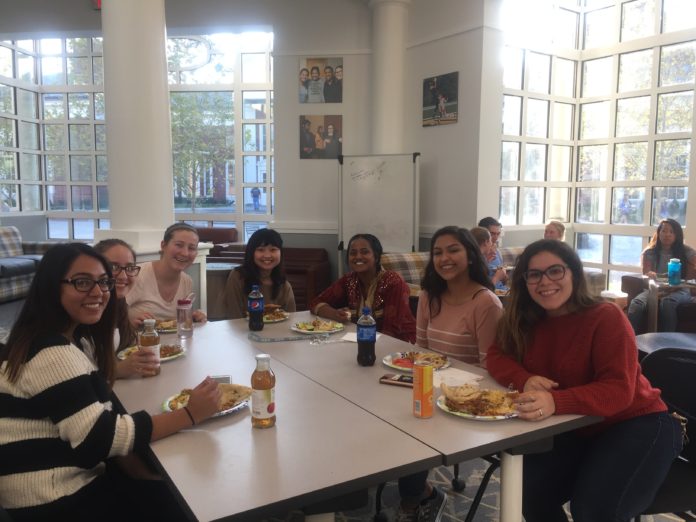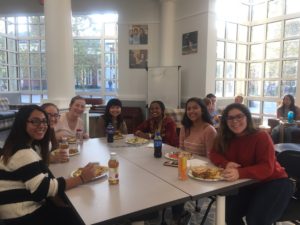

DePauw University students of minority faiths have found new ways to celebrate their religious traditions, despite difficulties. Senior Sarah Cooper, who practices Judaism, can celebrate Rosh Hashanah, the Jewish New Year, because of services provided by the Hartman House.
The Hartman House is an overarching entity that houses the center for spiritual life, the Russell J. Compton Center for Peace and Justice and DePauw Community Service. According to Kate Smanik, assistant dean of students for spirituality, service and social justice, the center for spiritual life exists to promote and support spiritual life on campus.
Students of different religious backgrounds have to prepare to celebrate holy days and festivities that will occur throughout the year, such as Rosh Hashanah and Eid, the Muslim holy month of fasting, which is celebrated at the end of Ramadan.
Cooper is preparing with Hillel, a Jewish student organization on campus, to celebrate both Rosh Hashanah and Yom Kippur later this month. In recognition of their holy days, Cooper and fellow Hillel member, sophomore Sarah Congress, will be missing a few days of class. Most professors are understanding of the need to miss class for religious reasons, but they need to be notified prior to accomodate for it, according to Congress.
Smanik said part of her job is to work with the practicing religious communities to find ways to make worship more accessible on campus. The Hartman House provides materials for worship and supplements their worship and celebrations with religious literacy.
The members of Hillel can travel to Indianapolis via a University bus to worship in a synagogue. For other practicing days, Hillel can utilize the Hartman House as a space for worship and executive meetings. Cooper said the Hartman House has been useful because of its resources, “If there was anything I need, I have no doubt that somebody would get it as soon as they could.”
Cooper believes her faith has become stronger since coming to DePauw. “I used to say I was Jewish, but emphasis on the -ish part,” Cooper said. “But coming here it has become a bigger part of my identity.”
Junior Pyi Theim Kyaw grew up with a strong religious faith because he was surrounded by a predominantly Buddhist community in Myanmar, where he grew up. Kyaw said upon coming to DePauw, he wanted to continue practicing Theravada Buddhism.
Kyaw spent the summer on campus and utilized the Hartman House resources almost every Sunday to meditate. “I am really grateful that the Hartman House has a little Buddha statue,” said Kyaw. Smanik said because the Buddhist community is growing, they are looking into more ways to celebrate their traditions.
For a Buddhist like Kyaw, it is harder to celebrate his traditions and holy days because of the small Burmese Buddhist community. One holiday is the Water Festival, which is a celebration of the new year that occurs in the second or third week of April. According to Kyaw, people throw water at each other for three to four days, which represents a cleansing of the sins from the past year.
Kyaw said the possibility of falling behind in class if he were to celebrate in Myanmar has made it difficult to celebrate the Water Festival at DePauw. “It is my favorite holiday. I wish I could do it,” Kyaw said.
First-year Hunzala Leghari recently celebrated Eid with the Muslim community. It was celebrated in the Union building where there was a variety of halal food, music and dancing. Leghari said, “It was possibly the best way possible to celebrate Eid.”
Leghari said the transition to DePauw was difficult, but having a roommate of the same religion, the Muslim Student Association (MSA), and the Hartman House have all been helpful in adjusting to practice on campus.
Friday prayers, are the most important, according to Leghari, and are typically prayed at the Hartman Centre in congression. Leghari wishes to educate more people on Islam and to dispel misconceptions. By adding more Halal options in the dining hall and giving people opportunities to learn, they will become more open and accepting, according to Leghari.
Congress noted many people observe and know about the typical Christian holidays, but are lacking in other religions. Congress said, “It is important to be patient, aware and understanding during holy days of all religions.”
According to Smanik, it is important for students of minority faiths to have their traditions celebrated on campus. “I always try to work with the students and faculty and staff that follow the traditions because lived experience matters,” said Smanik. “What really matters is the population here.”
